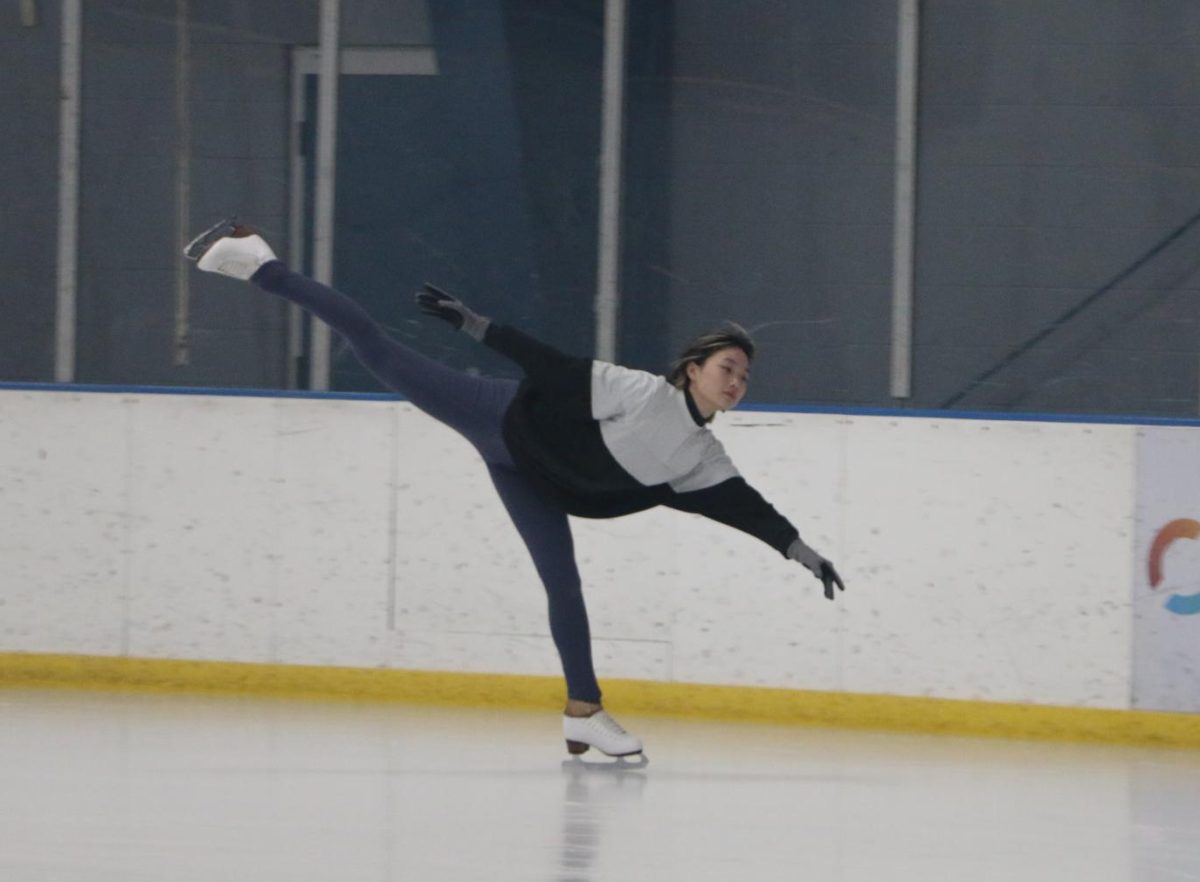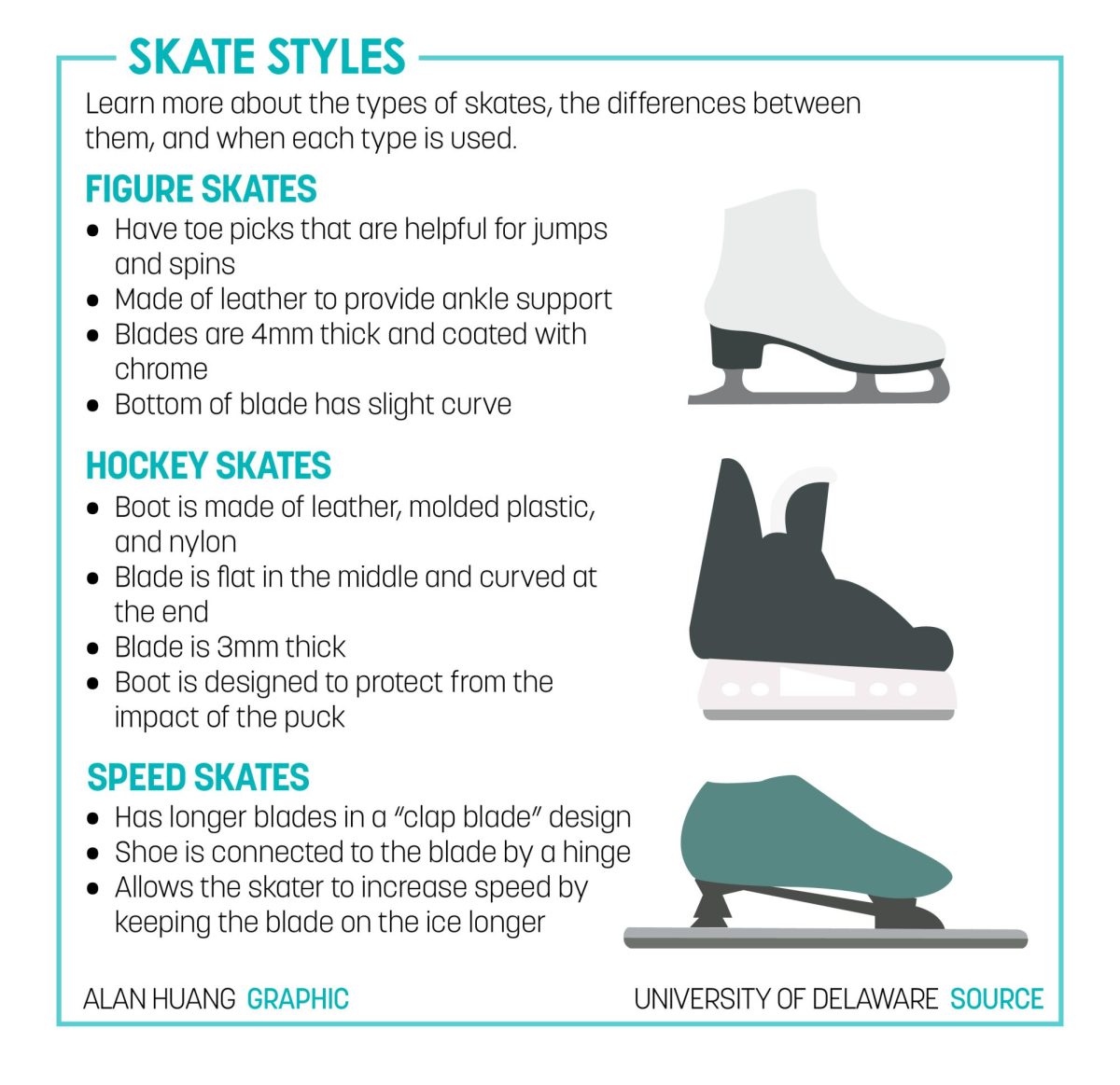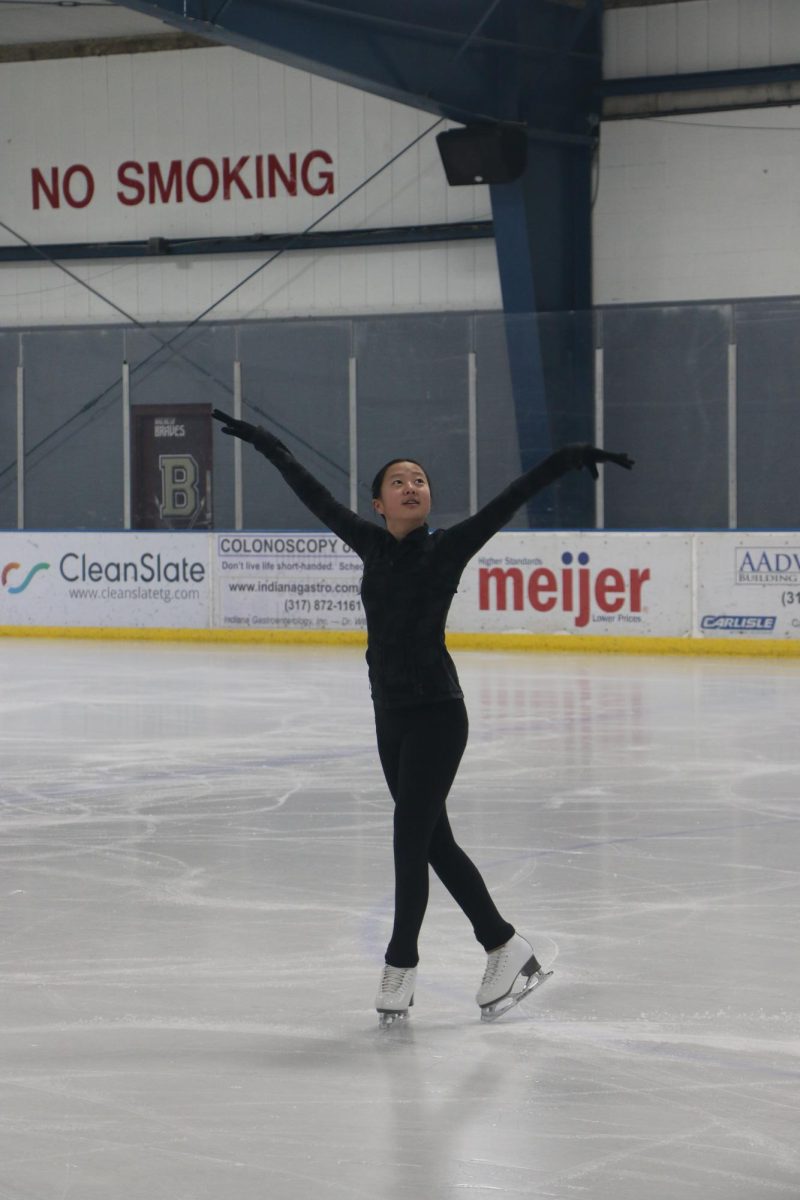
Grace Nie (Junior)
What made you start ice skating?
I started skating back when I lived in China, I think I was around 7 to 8. It wasn’t serious or anything but I would just go to the rink and skate around for about an hour, but once I moved (to America) in second grade, I started doing group lessons at Carmel Ice Skadium and around sixth grade is when I started private lessons and getting serious with it. That’s when I started practicing in the morning as well, and ever since then, I’ve been skating every single week.
How did moving affect your skating?
Moving didn’t really affect my skating that much. When I was still in China, I had only started for a couple months, and it wasn’t anything serious, just a hobby that I would go to every once a week just to have a bit of fun. I wasn’t doing lessons or anything.
Would you say skating is a hobby at this time?
I wouldn’t consider skating to be a hobby, because I invest a lot of time into it and I go to competitions too; I went to nationals twice. It’s not really a hobby—I don’t know how to describe it because obviously I’m still a student so I can’t pursue it full-time but it’s a sport that I do at a higher level and I can’t really consider it a hobby.
Are you planning on pursuing ice skating in the future?
I want to do it in college; figure skating isn’t an NCAA sport, it’s just considered a club sport because it’s not that “big” at the college level but I would love to be at the college skating scene but that all depends on what college I want to go to. Some of them don’t have a team, but maybe I’ll make one. Also, a lot of places don’t have rinks. Like IU ice skaters don’t have rinks so what am I supposed to do then? I’ll convince them to build a rink at IU.
How often do you compete at competitions?
I mentioned that I went to nationals, but it’s not the kind of nationals you might see on TV, like the US Championships. How I explain it is that there are two tracks that you can take. There’s “Excel” figure skating or “Well-Balanced” figure skating. “Well-Balanced” is the stuff you might see on TV, like triples, and if you do well, you’ll go to world championships or the Olympics. That’s for the people who are really good. Then “Excel” is where you’re at a good enough level where you’re spending a lot of time to do (figure skating) but you’re not being consumed by it. It’s kind of the “easier” version; you can still compete, but you won’t make it to the Olympics or anything. “Excel” season starts from Jan. and the qualifying season at June and nationals are typically mid to early July. In the last couple of seasons I started competing in Feb. but I think this season I want to compete in Jan. because I want a head start. So, from Jan. to June, I’ll have around one competition each month, so that’s around 6 competition.

How do you balance your time?
Honestly, I’ve been pretty lucky with orchestra in that it doesn’t coincide with competition time but last year I think during the spring concert, I had a competition that morning so I had to email the coordinator. You can email (them) to ask for them to place you last or first so that right after you can go home and just drive to the concert, so usually I haven’t had to miss out on competition because of other extracurriculars, but I feel like that will happen this year because I’m doing speech and debate, NHD, mock trial and orchestra. It’s stressful but you just have to plan everything beforehand. Usually there are a couple of choices each month for competitions that are nearby and you just have to cross your fingers and hope you can go to everything.
How do you schedule your practices?
I’m lucky that my practices aren’t after school, well I guess you can say that it’s lucky because it’s not right after school, rather it’s in the morning and it doesn’t coincide with other activities, but it’s also unlucky because I have to wake up at 5:30 a.m. four days a week. Monday through Thursday, and on Friday I skate in the afternoon and Saturdays I skate in the morning again.
How does the skating community at CHS affect you?
I definitely have good skater friends, like my friend Zoe Tu, she’s one of my best friends and I’ve known her since second grade because of skating. Which, I normally wouldn’t have because she’s a grade above me and we went to different elementary and middle schools. We also have a high school skating team at CHS and it’s just people from my club who are also on my team, so I made a lot of good friends through skating and I get to see them every now and then just at the school in passing.
Have you performed at Christkindlmarkt yet?
I have, I performed Nov. 25 and I’ll perform two more times on Dec. 16 and 23.
How do you determine your choreography in skating?
So for this year, I actually took the choreography of a skater who graduated last year. Usually, the coaches will assign people christmas music—it has to be in German or instrumental—they’ll choreograph it and give it to the skater but this year I already have a recording of my friend’s program. I learned a bit of it, but I also changed some parts that I didn’t like or didn’t fit my skating (style) and I’d choreograph that myself.
Do skaters get to have a say in their choreography?
It depends on the coach and the club but mine is pretty chill, she usually choreograph most of my program but if I don’t like a part them I’ll just play around with it and if I find a better alternative then she’ll be like ‘whatever’ as long as I do my jumps and my spins.
Do you get nervous when performing?
Yes, I do. It’s kind of like a love-hate relationship with skating, because I started doing figure skating seriously when I was like 11 or 12, which seems early but most people start at like 5 or 6. I never had a huge repertoire of going to competitions at a young age, and so around 7th or 8th grade, I was a teenager and pissy and worried about a lot of things like ‘what if I fall’ or ‘what if I don’t do perfect’, like I just want to do well. The stress accumulates and it’s different for each person who experiences it but I try to just be as positive as possible and get as much sleep as possible beforehand, it’s kind of hit or miss. The most you can do is to try your best because you’ve already done the training, there’s no point in stressing then because you’ve already done everything—which is easier said than done, but that’s what I try to think to myself.
Do you think starting later gave more disadvantages when skating?
I always think a lot to myself ‘I wonder what level I’d be at if I had started when everyone else started’ but I can’t really change it or go back in time, so I try to put in the most work now; put in my best effort day to day, try not to think about it too much and put in my best effort.
What made you want to start?
My mom said that in China I watched the Olympics and I told her ‘Mom, I want to go skate’ but I don’t remember this. I just thought it was cool, and didn’t really have any specific reasoning why I wanted to start. I did swimming at the time and I thought, ‘skating is like swimming but on the water’ and I liked water as a kid, so there’s no interesting story behind it or anything.
Would CHS students be successful at skating if they started now?
I think you can be successful at anything if you put in the work and you’re smart about how you’re putting in the work. For instance, like violin, if you’re practicing something over and over again and you’re not thinking about what you’re messing up on, you’re still going to improve but it’s going to be slow. You have to be methodical with the time that you spend practicing. Anyone can be successful at any age, you’re never too old to start a sport or skating. If you want to start skating and you’re passionate about it, there’s no reason not to, even if you think you’re too “old”.
Is there anything that you’d like to promote with skating?
I’ll advertise the CHS skating team. Right now, there’s only about 5 members but last year at our first competition, we only had 3 go. Even if you’re completely new but interested, you should still join and compete. If you want to start or you’ve just started, feel free to go. It’s a lot of fun and we’d love to have new members.
Rachel Zhou (Sophomore)

When are your upcoming performances or competitions?
I have a Christkindlmart performance on Dec. 16.
Why did you start ice skating?
I started around 5 years old, and I started because of my older brother. He played hockey and when I was really young, my mom would bring me to the rink to let me watch my brother play. Naturally, one day she just enrolled me in skating lessons since I was there anyways.
What makes you passionate about ice skating?
Whenever I step in the rink, it just feels like my problems melt away. When I’m on the ice, I focus on what I’m doing in the moment. Instead of thinking about school or like how much homework I have to do, I can focus on landing the jump or doing a move properly. It’s relaxing and I can set small goals for myself, I tell myself ‘I can land this jump’ and I just go step by step.
What is your favorite skating move?
I think it has to be the layback spin. I feel like the spin itself is just the epitome of skating. When you think of the sport, you think of the elegant classic that the move is. Also, it’s just really pretty to watch the dress flow around you when you spin.
Do you have future aspirations for skating?
I think I might quit next year. To be honest, I can’t keep waking up at 6 a.m. anymore. It’s hard to balance all my work, and next year I might choose difficult classes. The majority of my skating practice comes before school starts so I have to wake up at 6 to get an hour of practice in. Although it is not the most ideal situation, I think a pro of it is that I have the most of my time after I get home from school to do schoolwork. A con is that I have to go to bed early at around 11 p.m. because I have to get up at 6 the next morning.
How do your extracurricular activities conflict with ice skating?
I do violin and I recently joined Science Olympiad. These activities conflict with my skating activities a lot. For orchestra, I did Holiday Spectacular which meant that I had practices until 9:30 p.m. and shows where I would get home really late. It takes up a lot of my time, which means that I can’t go skating; even in the morning since I get home late, I wake up late as well. I’ve had to sacrifice a lot of my skating for orchestra. Another thing is that for Science Olympiad competitions, they usually occur on the weekends, while skating competitions also occur on the weekends. That 5 or 6 month window of time when there’s the most activity in Science Olympiad also conflicts with the skating competition season.
How do you manage your skating time?
I try to prioritize academics, specifically my extracurriculars over skating, because at the end, to me skating will always be a hobby and academics will carry on later in life. I want to try to continue skating through senior year but it has been tough, I’ve been debating on whether I should or if I shouldn’t. I’m not that serious but I really still try to do my best and improve in the sport.
How do you think ice skating affects your mental health?
At practice, I’m surrounded by my other friends that can jump higher or they can jump better, things like that. Figure skating can be really detrimental to your mental health, but at the same time it’s a breathtaking sport. In ways, it can be really harmful not just to my mental but also my physical. Waking up at 6 every morning is really tough to do, and just having the willpower to drag myself out of the bed is crazy. At competitions too, there are 10 qualified judges that just stare at only you on the ice. Their literal job is to see which one is better, to compare you and other skaters.
Do you get nervous before stepping on the ice?
Actually, yeah I do get really nervous before I step on the ice. It’s a part of the sport; being nervous before you step on and compete, it’s just kind of like how mentally strong you are to not let that get to you. Letting yourself know how much practice that went behind you, and personally, I’m not that great, I always fall during competitions. Even if I do good—perfect—during practice, I always fall. It’s a part of the pressure, knowing how important the competition is, qualifying and kind of to you and your own goals in a way.
What happens when you don’t meet your goals?
If I don’t meet my own goals, then it gets pretty disappointing. However, I do like to remind myself that ‘there’s always next time’ or I say ‘there’s always next week’, but if it’s a larger goal, obviously I get disappointed but reminding myself that I did the best that I could is all I can do. I just keep in mind that there is always a next time.
How has skating built your character?
I think skating has taught me a lot about time management and determination. I’ve cut on the time management a lot since I have to balance my butt load of homework and skating in the mornings and afternoons with competitions and extracurriculars. It’s taught me to be balanced and efficient, not spending too much time scrolling on my phone and stuff like that. It’s also taught me a lot about determination and the kind of literal falling and getting back up sort of thing. I know that if I don’t meet a goal, or if I don’t get a jump, I can always try and try again as long as I get up and skate.




























![Keep the New Gloves: Fighter Safety Is Non-Negotiable [opinion]](https://hilite.org/wp-content/uploads/2024/12/ufcglovescolumncover-1200x471.png)
















































![Review: “We Live in Time” leaves you wanting more [MUSE]](https://hilite.org/wp-content/uploads/2024/12/IMG_6358.jpg)
![Review: The premise of "Culinary Class Wars" is refreshingly unique and deserving of more attention [MUSE]](https://hilite.org/wp-content/uploads/2024/12/MUSE-class-wars-cover-2.png)
![Introducing: "The Muses Who Stole Christmas," a collection of reviews for you to follow through winter [MUSE]](https://hilite.org/wp-content/uploads/2024/12/winter-muse-4.gif)
![Review: "Meet Me Next Christmas" is a cheesy and predictable watch, but it was worth every minute [MUSE]](https://hilite.org/wp-content/uploads/2024/11/AAAAQVfRG2gwEuLhXTGm3856HuX2MTNs31Ok7fGgIVCoZbyeugVs1F4DZs-DgP0XadTDrnXHlbQo4DerjRXand9H1JKPM06cENmLl2RsINud2DMqIHzpXFS2n4zOkL3dr5m5i0nIVb3Cu3ataT_W2zGeDAJNd_E-1200x884.jpg)
![Review: "Gilmore Girls", the perfect fall show [MUSE]](https://hilite.org/wp-content/uploads/2024/11/gilmore-girls.png)
![Review in Print: Maripaz Villar brings a delightfully unique style to the world of WEBTOON [MUSE]](https://hilite.org/wp-content/uploads/2023/12/maripazcover-1200x960.jpg)
![Review: “The Sword of Kaigen” is a masterpiece [MUSE]](https://hilite.org/wp-content/uploads/2023/11/Screenshot-2023-11-26-201051.png)
![Review: Gateron Oil Kings, great linear switches, okay price [MUSE]](https://hilite.org/wp-content/uploads/2023/11/Screenshot-2023-11-26-200553.png)
![Review: “A Haunting in Venice” is a significant improvement from other Agatha Christie adaptations [MUSE]](https://hilite.org/wp-content/uploads/2023/11/e7ee2938a6d422669771bce6d8088521.jpg)
![Review: A Thanksgiving story from elementary school, still just as interesting [MUSE]](https://hilite.org/wp-content/uploads/2023/11/Screenshot-2023-11-26-195514-987x1200.png)
![Review: "When I Fly Towards You", cute, uplifting youth drama [MUSE]](https://hilite.org/wp-content/uploads/2023/09/When-I-Fly-Towards-You-Chinese-drama.png)
![Postcards from Muse: Hawaii Travel Diary [MUSE]](https://hilite.org/wp-content/uploads/2023/09/My-project-1-1200x1200.jpg)
![Review: "Ladybug & Cat Noir: The Movie," departure from original show [MUSE]](https://hilite.org/wp-content/uploads/2023/09/Ladybug__Cat_Noir_-_The_Movie_poster.jpg)
![Review in Print: "Hidden Love" is the cute, uplifting drama everyone needs [MUSE]](https://hilite.org/wp-content/uploads/2023/09/hiddenlovecover-e1693597208225-1030x1200.png)
![Review in Print: "Heartstopper" is the heartwarming queer romance we all need [MUSE]](https://hilite.org/wp-content/uploads/2023/08/museheartstoppercover-1200x654.png)



